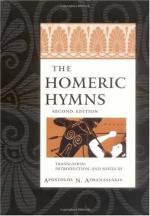Again, as aristocracies arose, the chief families desired to be sons of the Father in a special sense: not as common men are. Her Majesty’s lineage may thus be traced to Woden! Now each such descent required a separate divine amour, and a new scandalous story of Zeus or Apollo, though Zeus may originally have been as celibate as the Australian Baiame or Noorele are, in some legends. Once more, syncretism came in as a mythopoeic influence. Say that several Australian nations, becoming more polite, amalgamated into a settled people. Then we should have several Gods, the chief Beings of various tribes, say Noorele, Bunjil, Mungan-ngaur, Baiame, Daramulun, Mangarrah, Mulkari, Pinmeheal. The most imposing God of the dominant tribe might be elevated to the sovereignty of Zeus. But, in the new administration, places must be found for the other old tribal Gods. They are, therefore, set over various departments: Love, War, Agriculture, Medicine, Poetry, Commerce, while one or more of the sons take the places of Apollo and Hermes. There appears to be a very early example of syncretism in Australia. Daramulun (Papang, Our Father) is “Master of All,” on the coast, near Shoalhaven River. Baiame is “Master of All,” far north, on the Barwan. But the locally intermediate tribe of the Wiraijuri, or Wiradthuri, have adopted Baiame, and reduced Daramulun to an exploded bugbear, a merely nominal superintendent of the Mysteries; and the southern Coast Murring have rejected Baiame altogether, or never knew him, while making Daramulun supreme.
One obvious method of reconciling various tribal Gods in a syncretic Olympus, is the genealogical. All are children of Zeus, for example, or grandchildren, or brothers and sisters. Fancy then provides an amour to account for each relationship. Zeus loved Leto, Leda, Europa, and so forth. Thus a God, originally innocent and even moral, becomes a perfect pattern of vice; and the eternal contradiction vexes the souls of Xenophanes, Plato, and St. Augustine. Sacrifices, even human sacrifices, wholly unknown to the most archaic faiths, were made to ghosts of men: and especially of kings, in the case of human sacrifice. Thence they were transferred to Gods, and behold a new scandal, when men began to reflect under more civilised conditions. Thus all these legends of divine amours and sins, or most of them, including the wanton legend of Aphrodite, and all the human sacrifices which survived to the disgrace of Greek religion, are really degrading accessories




